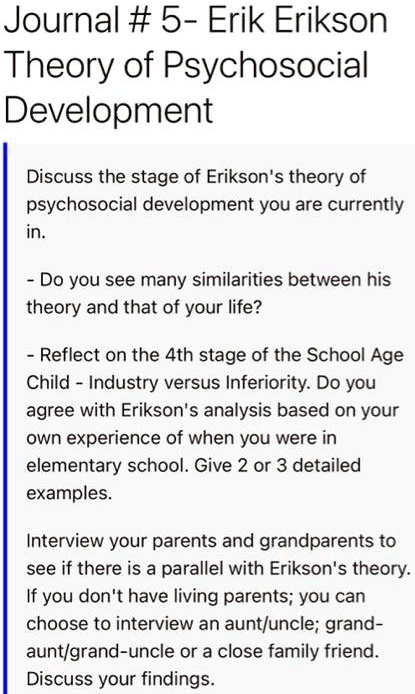Erikson's theory of psychosocial development is a well-known and influential theory that explains how people develop and grow throughout their lives. According to Erikson, each person goes through eight stages of development, starting at birth and continuing through old age. Each stage is characterized by a specific conflict or challenge that the person must confront and resolve in order to progress to the next stage.
One of the key features of Erikson's theory is that it emphasizes the importance of social and cultural influences on personal development. Erikson believed that people's relationships with others, and their experiences within their culture, have a significant impact on their development.
The first stage of Erikson's theory is the stage of trust vs. mistrust. This stage occurs during the first year of life and is characterized by the infant's developing sense of trust in the world and in the people around them. If the infant's basic needs are consistently met and their caregivers are responsive and caring, the child will develop a sense of trust. If, however, the child's needs are not met or their caregivers are neglectful or abusive, the child may develop a sense of mistrust.
The second stage is the stage of autonomy vs. shame and doubt, which occurs during the toddler years. At this stage, the child begins to explore their environment and gain a sense of independence. If the child is encouraged and supported in their exploration, they will develop a sense of autonomy and self-confidence. If, however, the child is overly controlled or criticized, they may develop feelings of shame and doubt.
The third stage is the stage of initiative vs. guilt, which occurs during the preschool years. At this stage, the child becomes more active and assertive and begins to take on leadership roles. If the child is encouraged to take initiative and is allowed to make decisions, they will develop a sense of purpose and direction. If, however, the child is discouraged from taking initiative or is punished for their actions, they may develop feelings of guilt.
The fourth stage is the stage of industry vs. inferiority, which occurs during the school-age years. At this stage, the child becomes more focused on achieving and performing well in school and other activities. If the child is successful and receives positive feedback, they will develop a sense of industry and competence. If, however, the child experiences failure or criticism, they may develop a sense of inferiority.
The fifth stage is the stage of identity vs. role confusion, which occurs during the adolescent years. At this stage, the young person begins to explore their own identity and figure out who they are and what they want to do with their lives. If the young person is able to successfully navigate this process and form a clear sense of identity, they will develop a strong sense of self. If, however, the young person is uncertain about their identity or experiences conflicting expectations from different sources, they may experience role confusion.
The sixth stage is the stage of intimacy vs. isolation, which occurs during young adulthood. At this stage, the young adult begins to form close, intimate relationships with others and may begin a romantic relationship or start a family. If the young adult is able to form close and satisfying relationships, they will develop a sense of intimacy and connection with others. If, however, the young adult is unable to form close relationships or experiences disappointment or isolation, they may develop a sense of isolation.
The seventh stage is the stage of generativity vs. stagnation, which occurs during middle adulthood. At this stage, the adult becomes focused on contributing to the next generation and may take on responsibilities such as parenting or mentoring. If the adult is able to find a sense of purpose and make meaningful contributions, they will








